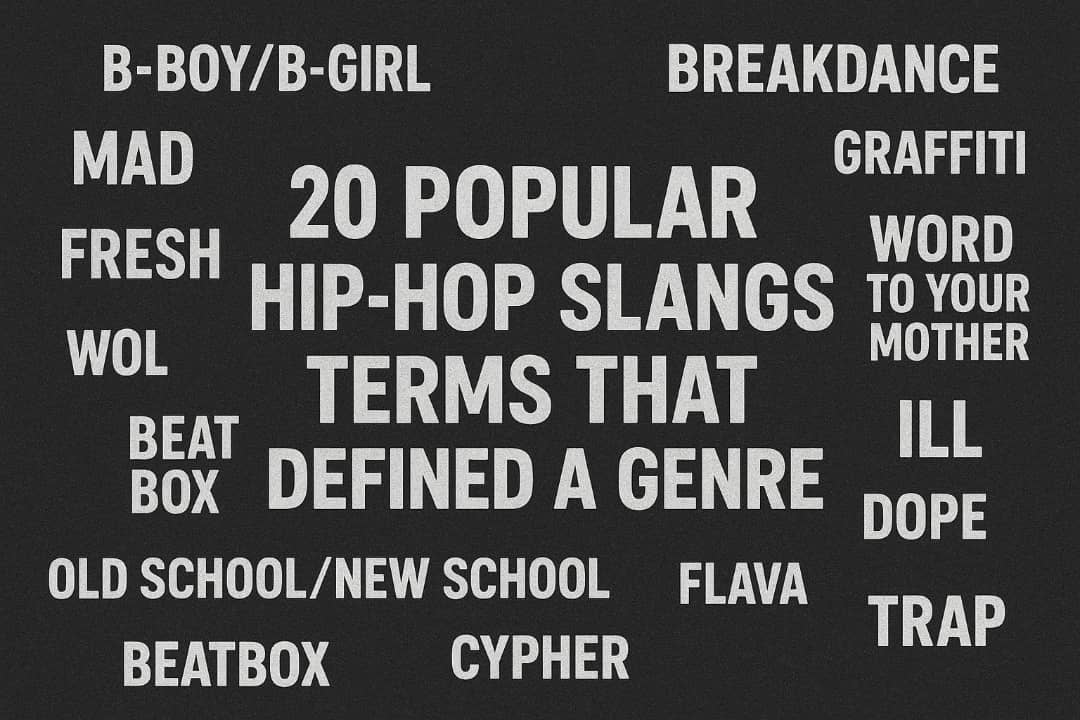Hip-hop did more than give the world a fresh sound, it introduced a vibrant vocabulary that still resonates today. From block parties in the Bronx to stadiums in Tokyo, hip-hop slang has traveled farther than most words ever will.
This article dives into 20 seminal terms that not only captured the spirit of the streets but also redefined global culture.
In a nutshell
- From Streets to Stage: Discover how hip-hop slang grew from urban neighborhoods into a global cultural force.
- 20 Power Terms: Explore the definitions, origins, and lasting impact of key hip-hop phrases that shaped the genre.
- Cultural Ripples: See how these words influenced fashion, politics, and everyday speech around the world.
- Evolving Lexicon: Understand how hip-hop slang continues to adapt, inspiring new generations and reshaping language.
SlangWise tip: “Language is the beat; slang is the rhythm, feel it, and you’ll never miss a step.”
Table of Contents
20 Popular Hip-Hop Slangs Terms That Defined a Genre
1. B-boy / B-girl
B-boy/B-baby is an hip-hop slang for a breakdancer or someone deeply embedded in hip-hop culture. Short for “break-boy” or “break-girl,” it emerged in the early 1970s when dancers would perform during the “break” in funk records.
Impact: B-boys and B-girls turned dance into an art form, inspiring global competitions and cementing breakdancing as a pillar of hip-hop’s four elements.
2. Breakdance
Breakdance is a hip-hop style of street dance featuring spins, freezes, and acrobatic moves.
It emerged in New York City clubs around 1973, evolving from James Brown’s “Good Foot” dance and funk moves.
Impact: Breakdance propelled hip-hop into mainstream media by the 1980s, showcased in films and international tours.
3. Graffiti
Graffiti in hip hop slang is a writing or drawings scribbled, scratched, or sprayed illicitly on a wall or other surface in a public place. Though tagging dates back centuries, modern graffiti in New York City began in the late 1960s, with artists like TAKI 183.
Impact: Graffiti gave hip-hop a visual voice, influencing streetwear fashion and gallery exhibitions worldwide.
4. MC
This is simply known as Master of Ceremonies; a rapper who addresses the audience, often improvising lyrics. Rooted in Jamaican sound-system culture of the 1950s, transplanted to New York in the 1970s.
Impact: The MC became hip-hop’s storyteller, turning battles and block parties into lyrical showcases.
5. DJ
DJ is hip-hop Disc Jockey; the artist who selects and plays records, often mixing and scratching. Hip-hop DJing began with Kool Herc, who isolated and looped drum breaks at Bronx parties in 1973.
Impact: DJing techniques like scratching became hip-hop’s signature sound, foundational to sampling in modern music.
6. Fresh
Freah means Cool, stylish, or excellent in hip-hop.
It’s an African-American Vernacular English (AAVE) popularized “fresh” in the late 1970s as a compliment for style or performance.
Impact: Became so ubiquitous that Run-D.M.C. titled their 1984 debut album Run-D.M.C., featuring the anthem “Rock Box,” celebrating the fresh sound.
7. Word to Your Mother
Word to your mother is a slang phrase of affirmation or agreement, sometimes used playfully. It gained traction in the 1980s through MC Hammer and other frontline performers.
Impact: Crossed into mainstream vernacular, featured in movies and TV, highlighting hip-hop’s widening influence.
8. Ill
It means excellent or impressive (the opposite of “sick”).
AAVE usage of “ill” as “exceptionally good” appeared in the late 1980s, solidifying with tracks like Black Sheep’s “The Choice Is Yours.”
Impact: “Ill” became a staple descriptor in music reviews and everyday speech.
9. Dope
Dope in Hip-hop slang means something is outstanding or great.
It originally meaning “drug,’’ “dope” flipped in late-’80s hip-hop circles to praise an artist or track.
Impact: Helped bridge underground and commercial hip-hop, with albums titled Dope solidifying the term’s positive connotation.
10. Props
Proper respect or recognition. Short for “proper respects,” it entered hip-hop slang in the early 1980s through artists giving each other credit at block parties.
Impact: “Props” became a universal gesture in music culture and beyond, often verbalized as “give props.”
11. Old School / New School
Old School refers to early hip-hop style; “New School” denotes a modern or updated approach. It is used by DJs and MCs by the mid-1980s to distinguish 1970s pioneers from emerging artists.
Impact: These labels guide fans and historians through hip-hop’s evolving timeline.
12. Beatbox
Beatbox in hip-hop is a vocal percussion that mimics drum machines. And it was popularized in the 1980s by artists like Doug E. Fresh and Buffy.
Impact: Gave hip-hop performances a raw, live element; inspired beatbox battles that still draw crowds today.
13. Battling
Battling is a competitive verbal or dance showdown between artists. Streets of the Bronx in the ’70s and ’80s, where DJs and MCs challenged each other for supremacy.
Impact: Battles became televised spectacles (e.g., Red Bull BC One), sharpening skills and fueling hip-hop’s competitive edge.
14. Cypher
Cypher is a gathering where MCs take turns freestyling in a circle. It is rooted in Jamaican sound systems; the term “cypher” emphasizes equality and communal creativity.
Impact: Cyphers foster collaboration, with landmark sessions (like BET’s Freestyle Friday) launching careers.
15. Flava
Flavar in hip-hop is a variant of “flavor,” meaning style or unique quality. AAVE influence in the late 1980s; used by LL Cool J and Flavor Flav (of Public Enemy).
Impact: “Flava” underscored the importance of individuality, influencing branding in music and fashion.
16. Sample
Sample in hip hop slang is a snippet of a recording reused in a new track. DJs in the 1970s looped drum breaks; by the ’80s, producers like Marley Marl and the Bomb Squad built hits on sampled beats.
Impact: Sampling fueled legal debates over copyright, reshaping music industry practices.
17. Trap
Trap originally referring to places where drugs are sold; now a hip-hop subgenre characterized by hard beats and lyrical content about street life. It emerges from the Southern U.S. cities in the early 2000s, especially Atlanta.
Impact: Trap became mainstream by the 2010s, influencing pop music and global production styles.
18. Wack
Wack is another hip hop slang that means lacking skill or appeal; the opposite of “ill” or “dope.”
It is an AAVE term that entered hip-hop slang in the 1980s as a critique of weak performances.
Impact: Served as a sharp diss in rap battles and reviews, reminding artists to stay authentic.
19. Mad
Mad in hip-hop lingo means very or extremely (e.g., “mad skills”).
It is an informal speech in the U.S. Northeast, adopted by hip-hop artists in the 1990s.
Impact: “Mad” emphasized intensity, later spilling into skate and punk cultures.
20. OG
OG = Original Gangster; a veteran or highly respected member of the community. of hip-hop. It is a West Coast hip-hop in the late 1980s, popularized by Ice-T’s 1991 album O.G. Original Gangster.
Impact: Transcended hip-hop to honor pioneers in any field, from sports to business.
Final Thought: Beyond the Terms – The Power of Hip-Hop Slang
Each of these 20 terms tells a story of creativity born from adversity, of community forging its own voice amid social and economic challenges. Hip-hop slang did more than describe a scene—it built it.
Words like cipher, props, and OG fostered respect and inclusion, while ill, dope, and fresh celebrated excellence and style. From turntables to TikTok, hip-hop slang continues to influence the way people talk, dress, and connect.
Global Reach: Today, terms such as “trap” and “wack” are understood from Tokyo to Toronto. Hip-hop’s language has become a shared lexicon, bridging neighborhoods and nations alike.
Industry Impact: Record labels, advertisers, and filmmakers tap into hip-hop slang to signal authenticity. That commercial embrace has driven revenue streams worth billions, yet the culture still roots itself in original street creativity.
Future Evolution: As the next generation of artists experiments with AI beats and virtual performances, new slang will emerge. One thing remains certain: hip-hop’s linguistic legacy will keep changing the world, one phrase at a time.
References
Quick authority check: For a concise history of hip-hop’s origins, see the Britannica entry on hip-hop here. To explore how slang shapes language, consult Merriam-Webster’s resources on slang here.

